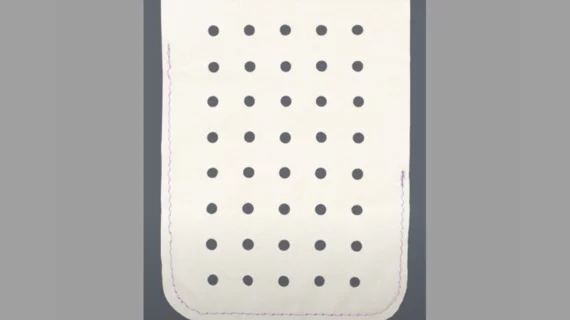FDA clears new drug-eluting envelope for implantable cardiac devices—CEO sees it as ‘tip of the iceberg’
Elutia, a Maryland-based healthcare technology company, has received clearance from the U.S. Food and Drug Administration (FDA) for EluPro, its new biologic envelope specifically designed for patients with implantable pacemakers and defibrillators. It was also cleared for use when implanting other types of devices, including neurostimulators and neuromodulators.
According to Elutia, EluPro is the first drug-eluting envelope of its kind to be cleared by the FDA. It was built with natural extracellular tissue matrix, and its walls are embedded with rifampin and minocycline, two antibiotics that are delivered to the patient for an extended period of time following implantation. The device is designed to regenerate into a “protective pocket of the patient’s own tissue,” significantly reducing the risk of infection, skin erosion or other surgical complications.
“Post-operative infection, migration and erosion can result in significant morbidity and mortality for patients receiving a pacemaker or defibrillator. That is why we developed the antibiotic-eluting BioEnvelope,” Elutia CEO Randy Mills, PhD, said in a prepared statement. “While the approval of EluPro is a major value inflection for Elutia, we believe it is just the tip of the iceberg. We have created a platform to protect patients from the foreign body response that can inevitably develop with any long-term implantable device. We intend to rapidly extend our product offering to other indications as we fulfill our mission to humanize medicine so patients can thrive without compromise.”
“When I implant a pacemaker or defibrillator, minimizing the risk of any future complications is crucial,” added Benjamin D’Souza, MD, a cardiologist familiar with the technology, associate professor of medicine at the University of Pennsylvania and section chief of cardiac electrophysiology at Penn Presbyterian Medical Center. “However, the body’s natural immunity can treat the device like a foreign object contributing to inflammation, causing device migration, potentially eroding through the skin, or sometimes causing a serious infection. Those are the specific problems EluPro was designed to solve.”
This is the second FDA-cleared device designed to protect against EP implantable device pocket infections. The first was the Tyrx absorbable antibacterial envelope in 2013.
Elutia was known as Aziyo Biologics until the company rebranded in 2023.

